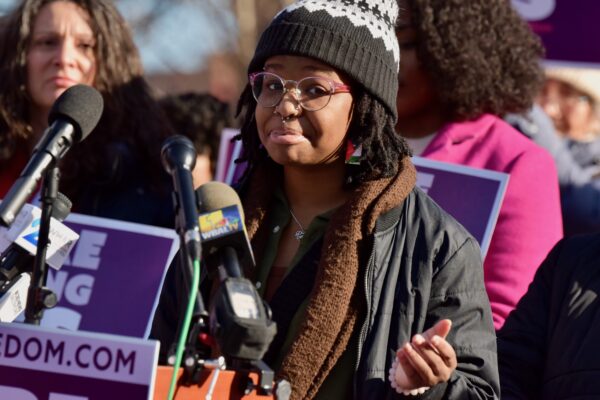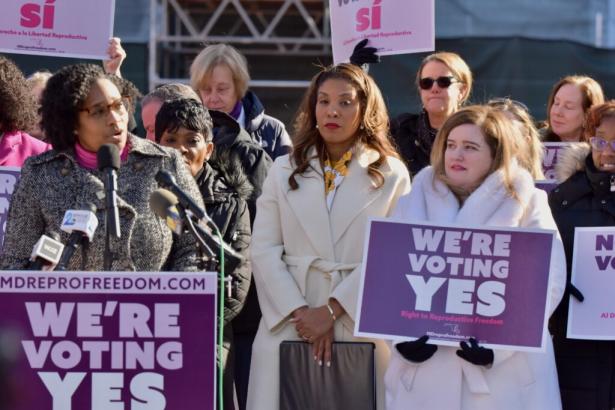Referendum on Abortion Access Gets Kick-Off Rally As Advocates Prep for Nov. Ballot
Abortion rights advocates have launched a campaign to inform voters about what’s on the November ballot: an option to alter the state constitution to protect access to abortion for all Marylanders.
Maryland first lady Dawn Moore, members of the General Assembly and pro-abortion advocates gathered at Lawyers Mall in Annapolis Monday to raise awareness about the upcoming proposed constitutional amendment posing the question of abortion to voters.
The event coincided with the 51st anniversary of the landmark U.S. Supreme Court ruling, Roe v. Wade, which affirmed federal protections on a person’s right to terminate their pregnancy. That ruling was reversed in 2022, giving individual state legislatures the authority to restrict or protect access to abortion.
“While states like our neighbor, West Virginia, passed a near total abortion ban and closed their doors on reproductive rights, Maryland has opened ours,” Moore said. “So Maryland is doing the right thing today, but we don’t know who our elected leaders are going to be 20, 30 years from now.”
In the 2023 session, Gov. Wes Moore (D) signed a package of bills that protected access to abortion services, declaring Maryland a “safe haven” for those within the state and those who come in from more-restrictive states seeking abortions.
One of those bills created the “Right to Reproductive Freedom” constitutional amendment, which says “that every person, as a central component of an individual’s rights to liberty and equality, has the fundamental right to reproductive freedom, including but not limited to the ability to make and effectuate decisions to prevent, continue or end one’s own pregnancy.”
Marylanders will get to decide if the the state constitution should include that language on Nov. 5, 2024, and a new abortion rights group called Freedom in Reproduction-Maryland is taking the lead, working with other abortion rights groups to persuade voters to approve the new language in an informational campaign called “Vote Yes on Reproductive Freedom.”
“We have the opportunity to send a strong message nationwide: Marylanders overwhelmingly demand their bodily autonomy and reproductive rights,” said Erin Bradley, chair of Freedom in Reproduction-Maryland.
House Speaker Adrienne A. Jones (D-Baltimore County) voiced her support for the measure at the press conference. Jones was an early advocate of the proposed constitutional amendment.
“It does not matter what Texas, West Virginia or any other state legislature does. They will never dictate what Maryland does,” she said.

Ren Culbreath, 20-year-old a Baltimore County resident. Photo by Bryan P. Sears.
Ren Culbreath, a 20-year-old Baltimore County resident who spoke at the press conference, is hoping to help young Marylanders get involved in the referendum effort and vote to enshrine abortion access in the state Constitution.
“It’s really important for us to know what’s going on in our world…It feels important,” Culbreath said. “It feels necessary because the youth are going to take over and then be in these positions of power, and be in these positions to make change.
The Moores are headlining a high-dollar fundraiser for Freedom in Reproduction-Maryland Wednesday evening at a private home in Annapolis. Ticket prices run from $5,000 to $25,000.
In 1992, a ballot question enshrining reproductive rights in Maryland law passed with 62% of the vote. Advocates believe the current national political environment necessitates protecting abortion rights in the state constitution. But there is some organized opposition in Maryland.
A ballot issue committee called Health Not Harm MD is urging voters to reject the constitutional amendment on the November ballot, saying that the measure would “outlaw protections for the most vulnerable and would eliminate basic health and safety regulations that exists to protect women and children.”
The group also argues that the amendment “threatens to eliminate parental rights to make important medical decisions for their minor children.”
Deborah Brocato, president of Health Not Harm MD, previously led a referendum effort in 2022 to overturn the state’s Abortion Care Access Act. The effort failed because organizers did not obtain enough signatures to qualify for the ballot.
According to a campaign finance statement filed with the Maryland State Board of Elections last week, Health Not Harm MD reported raising $5,704.99 over the past few months — $5,000 from a donation from Robert Brocato, a Towson attorney who appears to be Deborah Brocato’s spouse. The group had $5,337.21 in the bank as of Jan. 10.
2024 legislative efforts
While the 2023 legislative session created a bundle of successful abortion-related legislation, urging Marylanders to approve the constitutional amendment will be a high priority for pro-abortion lawmakers.
But there are some reproductive-health related bills in the works for the current session, according to Sen. Ariana B. Kelly (D-Montgomery), one of the top lawmakers for pro-abortion legislation.
“We are very focused on the referendum. It needs to be successful,” Kelly said. “But there are some pieces of legislation that deal with reproductive health and access to care that I think are going to be important.”
She said that she has a “follow-up” bill to 2023 legislation to increase access contraceptives on college campuses.
In 2023, the General Assembly passed SB 341 and HB 477, which requires that public 4-year universities provide reproductive health services or refer a student to such services. Kelly, along with Del. Stephanie Smith (D-Baltimore City), are working on legislation that expands that requirement to public community colleges.
Kelly said she also is working on a “clean up” bill to repeal certain state statutes to improve access to contraceptives. She said there may be additional bills that protect funding for reproductive health clinics, but those bills have not been filed.
Danielle J. Brown is a new Maryland resident covering health care and equity for Maryland Matters. Previously, she covered state education policy for three years at the Florida Phoenix, along with other topics such as abortion access and LGBTQ+ issues.
Maryland Matters is a trusted nonprofit and nonpartisan news site. We are not the arm of a profit-seeking corporation. Nor do we have a paywall — we want to keep our work open to as many people as possible. So we rely on the generosity of individuals and foundations to fund our work.


Spread the word